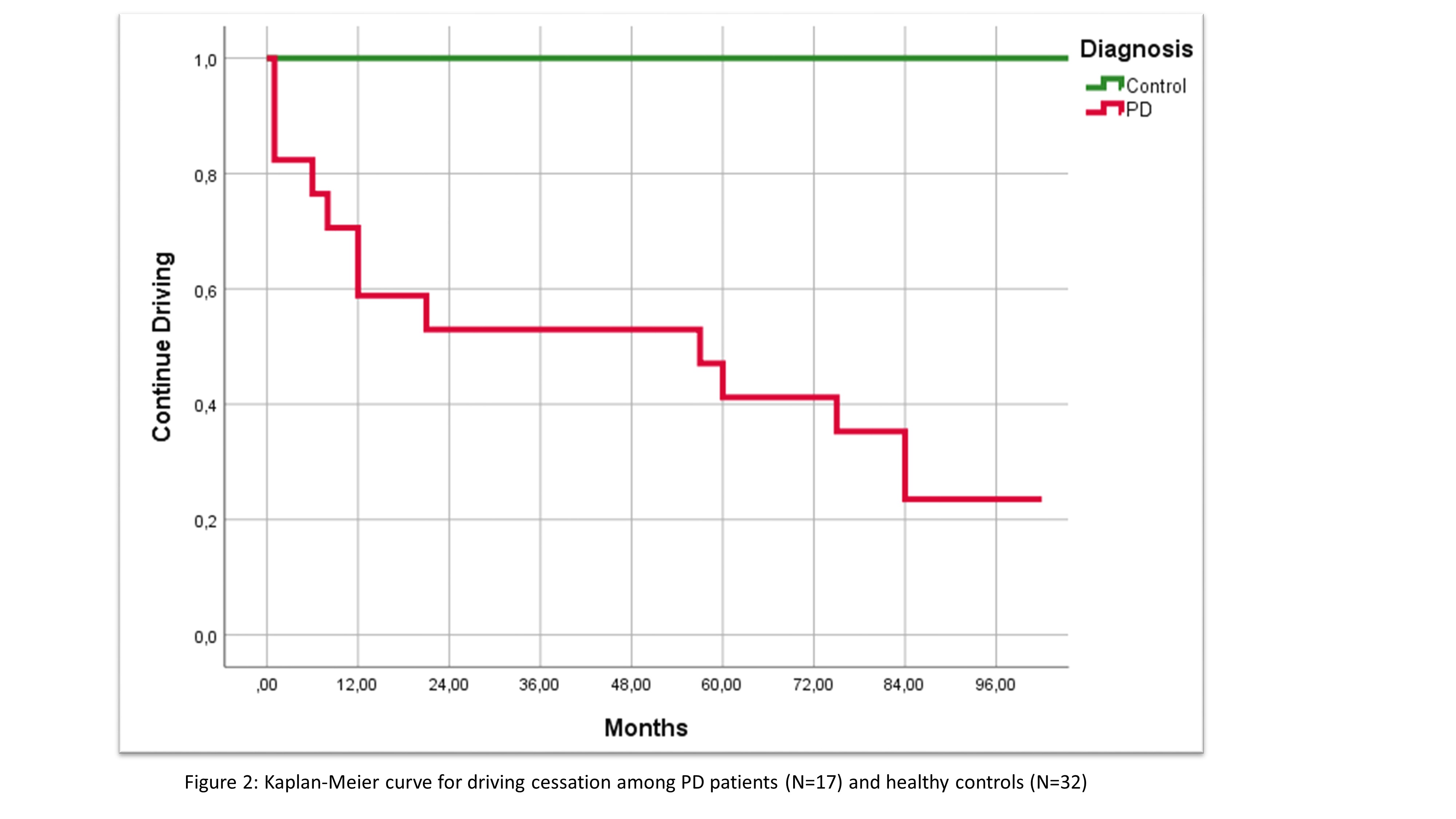Objective: We sought to identify predictors of driving cessation among PD patients.
Background: Motor and cognitive impairment of PD patients interfere with their driving ability.
Method: We examined 17 active drivers with PD (1 Woman, Mean Age 65 years old) and 32 healthy controls (18 Women, Mean Age 64 years old). Baseline evaluation included neurological and neuropsychological assessment and a driving simulator test. Re-evaluation after a mean period of 60 months included a structured interview with patients and caregivers. Primary endpoints were driving cessation and death. When the primary endpoints were not met, we performed a final evaluation after a mean period of 84 months.We examined 17 patients with PD (1 Woman, Mean Age 65 years old) and 32 healthy controls (18 Women, Mean Age 64 years old). Baseline evaluation included neurological and neuropsychological assessment and a driving simulator test. Re-evaluation after a mean period of 60 months included a structured interview with patients and caregivers. Primary endpoints were driving cessation and death. When the primary endpoints were not met, we performed a final evaluation after a mean period of 84 months.
Results: 5 patients died during follow up (29%, p<0,001 / Mean time to death: 63 months), while 13/17 ceased driving (76%, p<0,001 / Mean time to cease: 32 months). Main reason to cease driving was patients’ will (58%). 44% of patients had at least one dangerous driving event during follow-up (p<0,01). Performance on Hopkins Verbal Learning Test (HVLT) (r=-0.7, p=0.04) and simulator accidents (r=0.6, p=0.05) at baseline evaluation had a strong correlation with driving cessation probability. HVLT, Trail-Making (TMT), Rapid Pace Walk (RPW) and Tandem Walking (TWT) tests were correlated with survival. Only few prospective studies on the subject “PD and Driving” exist in the literature with heterogenous methodology and mixed results.
Conclusion: PD patients cease driving earlier than their healthy counterparts and have a higher accident risk. Simulator tests along with a neuropsychological and motor evaluation may identify predictors of driving cessation and disease progression. Larger prospective studies are needed to confirm our findings.
Preliminary results of the present study were presented in the 9th Congress of European Academy of Neurology (1-4 July 2023, Budapest).
Kaplan-Meier curve for driving cessation
To cite this abstract in AMA style:
P. Stamatelos, P. Hatzaki, I. Beratis, D. Pavlou, N. Andronas, E. Stanitsa, S. Fragkiadaki, D. Kontaxopoulou, A. Bonakis, A. Economou, G. Yannis, L. Stefanis, S. Papageorgiou. Parkinson’s Disease (PD) and predictors of Driving Cessation: Results from a 6-year Longitudinal Study and a systematic review of the literature [abstract]. Mov Disord. 2024; 39 (suppl 1). https://www.mdsabstracts.org/abstract/parkinsons-disease-pd-and-predictors-of-driving-cessation-results-from-a-6-year-longitudinal-study-and-a-systematic-review-of-the-literature/. Accessed December 27, 2025.« Back to 2024 International Congress
MDS Abstracts - https://www.mdsabstracts.org/abstract/parkinsons-disease-pd-and-predictors-of-driving-cessation-results-from-a-6-year-longitudinal-study-and-a-systematic-review-of-the-literature/

